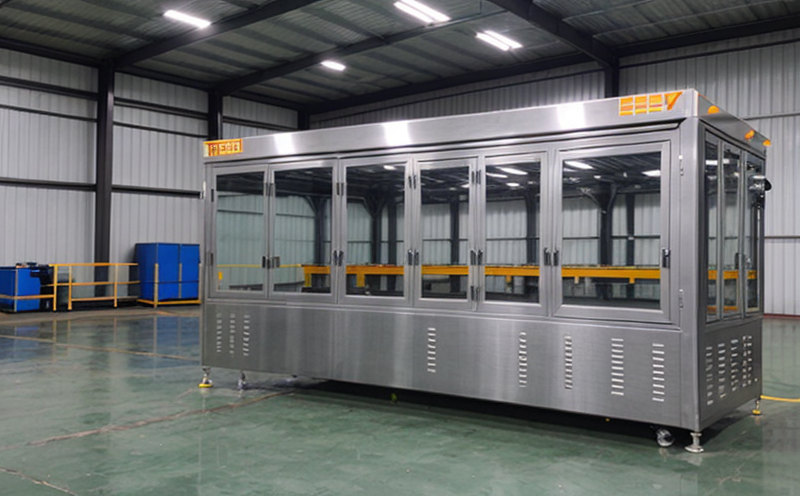ASTM E8/E8M Standard Test Method for Tensile Properties
The ASTM E8/E8M standard method is a widely recognized procedure used to determine the tensile properties of metallic materials. This test evaluates how metals, particularly those commonly found in packaging applications, respond under stress by measuring their yield strength, ultimate tensile strength (UTS), and elongation at break. These parameters are crucial for understanding the mechanical behavior of metal packaging, ensuring they can withstand the stresses encountered during manufacturing, transportation, and use.
The ASTM E8/E8M test is essential in quality assurance processes to validate that materials meet specific performance requirements set by regulatory bodies or internal standards. For instance, it ensures that aluminum cans used for beverages have adequate tensile strength to maintain their structural integrity under various conditions. The procedure involves clamping a specimen between two grips and applying tension until failure occurs.
Understanding the tensile properties of metals is vital in the packaging sector as it influences product safety and consumer satisfaction. For example, if a metal can has insufficient tensile strength, it may fail prematurely under pressure or temperature changes, leading to leaks or burst containers. This could result in wasted products and potential contamination risks.
The ASTM E8/E8M test is also important for R&D engineers who are developing new packaging materials and designs. By using this standard method, they can accurately assess the performance of novel alloys or modified processes. The results provide critical insights into how changes affect material properties, guiding further iterations towards more robust solutions.
For compliance officers responsible for ensuring regulatory adherence, knowing the tensile properties ensures that products comply with relevant standards such as ISO 15673 for aluminum cans. This helps avoid non-compliance issues and associated penalties while maintaining brand reputation and consumer trust.
In summary, the ASTM E8/E8M test is a fundamental tool in metal packaging testing, providing essential data on tensile properties that underpin quality assurance, R&D efforts, and regulatory compliance within the sector.
Why It Matters
The importance of the ASTM E8/E8M standard method cannot be overstated. Metal packaging, especially in sectors like food and beverage, must meet stringent standards to ensure safety and quality. Here’s why the tensile properties are critical:
- Safety Assurance: Adequate tensile strength prevents premature failure of containers, reducing risks associated with leaks or bursts.
- Potential Cost Savings: Ensuring materials meet specified tensile requirements can eliminate costly recalls and product rejections downstream in the supply chain.
- Consumer Trust: Reliable packaging builds confidence among consumers, enhancing brand loyalty.
- Regulatory Compliance: Meeting industry standards like ISO 15673 ensures adherence to international regulations, avoiding potential legal issues and fines.
The ASTM E8/E8M test is not just a procedural step but a critical component of the overall quality management system in metal packaging. It helps manufacturers maintain consistent product performance across different batches and environments, ensuring that each can or container performs as expected under real-world conditions.
Quality and Reliability Assurance
The ASTM E8/E8M standard method plays a pivotal role in the quality control processes of metal packaging manufacturers. By systematically testing tensile properties, companies can identify potential weaknesses early in the production cycle, ensuring that only high-quality materials make it to market.
During the manufacturing process, metals undergo various stages where stress is applied. For instance, during the rolling or drawing of aluminum sheets for cans, tensile strength must be carefully controlled. The ASTM E8/E8M test allows manufacturers to monitor these parameters continuously, making adjustments as necessary to maintain optimal performance.
In addition to manufacturing, post-production testing using this method ensures that packaged goods are safe and reliable throughout their lifecycle. This includes storage conditions, transportation logistics, and even consumer handling practices. Understanding the tensile properties helps in designing packaging that can withstand these variables without compromising safety or integrity.
The reliability aspect of metal packaging is crucial for maintaining product quality over time. For example, a can made from materials with insufficient tensile strength may develop internal stress cracks during storage, leading to compromised contents and potential contamination risks. By adhering to the ASTM E8/E8M standard method, manufacturers can mitigate such issues, ensuring that products remain intact and safe until they reach consumers.
In summary, the ASTM E8/E8M test is an integral part of quality assurance in metal packaging, providing critical data that enhances product reliability and safety across various stages of production and use.
Environmental and Sustainability Contributions
- Recycling Efficiency: Metals like aluminum used in packaging have high recyclability rates. Ensuring tensile strength allows for easier recycling, reducing environmental impact and resource consumption.
- Energy Savings: Stronger metal structures can optimize design, potentially leading to less material usage while maintaining structural integrity, thus saving energy during production processes.
- Waste Reduction: By using the ASTM E8/E8M test to ensure optimal tensile properties, manufacturers reduce waste by minimizing defective products and rework. This translates into lower environmental footprints.
The ASTM E8/E8M standard method not only supports quality assurance but also contributes positively to sustainability goals. It encourages responsible metal usage in packaging, promoting circular economy principles that benefit both the environment and industry stakeholders.





